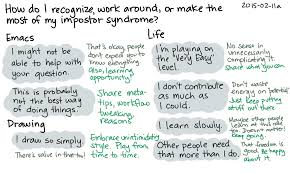
Think you’re the only one who feels like you don’t quite belong or deserve your success? You’re not alone. That persistent fear of being ‘found out’ as not as intelligent, talented, or deserving as people think is known as impostor syndrome. And guess what? It’s more common than you might realize.
Impostor syndrome isn’t just about self-doubt; it’s a complex phenomenon where high-achieving individuals believe they’re not worthy of accolades and that their achievements are products of luck or error. This can lead to a cycle of anxiety and stress, even in the face of evidence to the contrary of their fears.
Understanding impostor syndrome is essential, not only for those who experience it but also for organizations striving to nurture healthy, supportive work environments. It’s often swept under the rug, but bringing it to light is the first step in addressing it properly. So, I’m here to help you peel back the layers and understand the nuts and bolts of this psychological pattern.
The Inner Workings of Impostor Syndrome
To understand impostor syndrome, imagine it’s like a software glitch in your brain’s operating system. It’s a psychological pattern where people doubt their accomplishments and have a persistent, internalized fear of being exposed as a ‘fraud’. Despite evident success, individuals with impostor syndrome can’t shake off the feeling of being unworthy or chalk up their achievements to luck rather than skill or effort.
This isn’t just about feeling occasionally out of your depth; it’s a chronic sense of self-doubt that lingers despite positive feedback and external validation. It all starts with how we process our achievements and failures. For some, every success is discounted as a fluke, while every mistake is magnified, feeding into a cycle of negative self-talk and anxiety about being ‘found out’.
The common triggers vary from person to person, but there are patterns. High-achievers and perfectionists often find themselves in this trap, especially in competitive environments. New roles, promotions, or tackling unfamiliar tasks can also light the fuse. It’s not about the actual lack of competence but about the subjective interpretation of one’s abilities and efforts.
And it’s all about spectrum. Impostor syndrome doesn’t hit everyone with the same intensity. Some might experience faint whispers of doubt while others face a deafening roar that cripples their ability to appreciate their success. It’s important to recognize where you or someone else might be on this spectrum to address it effectively.
If you’re curious about how impostor syndrome might be affecting your life or career, or if these feelings sound all too familiar, the next section will dive deeper. We’re going to look at who typically falls prey to these patterns and what kind of impact it can have on different groups.
Who Falls Prey to Impostor Syndrome?
You might be wondering if impostor syndrome chooses its victims selectively. The truth is, it can affect anyone, regardless of their success, background, or age. But certain demographics may be more susceptible, and not always for the reasons you might think. Let’s talk about who typically feels the sting of this psychological pattern.
Research indicates that impostor syndrome can strike anyone, but it tends to be more prevalent in high-achievers and perfectionists. It’s seen often in students and academics, as well as in people starting new roles or tackling unfamiliar challenges. However, this isn’t just about personal traits; it’s also about the environments we navigate. Societal expectations, workplace cultures, and even our upbringings can amplify impostor feelings.
One of the most insight-provoking areas of impostor syndrome research revolves around gender. Studies have shown that women, especially in male-dominated fields, report feelings of fraudulence more often than their male counterparts. This points to a bigger conversation about how gender roles and biases contribute to self-doubt and perceived inadequacy.
But it’s not just about gender. Impostor syndrome transcends many boundaries. Minority groups, particularly those underrepresented in their fields, and individuals with high-pressure family expectations, can feel like they are constantly having to prove their worth. These pressures can be fertile ground for impostor feelings to take root and grow.
Diving into personal accounts from a spectrum of backgrounds, I’ve gathered stories that aren’t just anecdotal—they’re reflective of a widespread issue. From the newly promoted manager who feels like they’re way over their head, to the first-generation college student questioning their place on campus, impostor syndrome has an array of faces and stories.
Now, understanding who is affected by impostor syndrome sets the stage for grasping its broader impact. It isn’t something that just causes a moment of self-doubt and then passes. Impostor syndrome has the capacity to leave deep imprints on personal and professional lives. That takes us into the next section, where you’re going to find out about the true cost of these persistent feelings of self-doubt.
Measuring the Impact on Personal and Professional Lives
Now, impostor syndrome isn’t just a fleeting case of self-doubt. It’s a persistent voice in your head that can cast a long shadow over both your personal life and professional trajectory. In the workplace, it might creep up as a silent career inhibitor, making you second-guess every decision and shrinking back from opportunities that are squarely within your reach.
This isn’t just about individual careers, it’s also about how impostor syndrome can impact mental health. I’ve seen firsthand how it can lead to chronic stress, anxiety, and in some cases, even depression. The constant self-scrutiny and fear of being ‘found out’ can be incredibly draining. Plus, when your identity is tied up in your work, the stakes feel even higher.
Don’t forget, the personal toll often has a ripple effect leading to tangible repercussions in the workplace. This might manifest as procrastination, over-preparation for tasks, or avoidance of taking on new responsibilities. The result? A hit to productivity and potentially stalling one’s career. In my opinion, workplaces need to be acutely aware of these dynamics.
Individuals often don’t realize how widespread this issue is. But here’s the crux: You’re not alone in these feelings, and the cycle can be broken. Understanding the effects is the first step; going forward, we’ll explore actionable strategies to regain control over your professional story and mental narrative.
Strategies to Overcome Impostor Syndrome
You’re probably looking for ways to ditch those nagging feelings of being a fraud, right? Well, you’re in luck. There are actionable steps you can take to give impostor syndrome the boot.
Start by acknowledging your feelings. This isn’t just about suppressing doubts; it’s about understanding them. When you catch yourself downplaying your achievements or fearing being ‘exposed,’ pause and reflect.
Document your successes. I mean, literally write them down. This helps solidify your accomplishments in your mind and gives you tangible proof of your capabilities.
Seek objective feedback. Sometimes, you need an external perspective to counteract the distorted view you might have of your own skills and contributions.
Practice self-compassion. Be as kind to yourself as you would be to a friend in the same situation. Perfection isn’t the goal; continued learning and growth are.
Find mentors and role models. Look for people who’ve been where you are and learn from their experiences. They can offer valuable insights and remind you that you’re not alone in this fight.
Now, transitioning towards personal empowerment isn’t a one-time event. It’s human to slide back into old patterns, and that’s okay. Each time you challenge these thoughts, you’re building strength.
Next up, you’ll learn how channeling impostor syndrome can actually lead to significant personal development. It’s all about flipping the script and making it work in your favor.
Transforming Impostor Syndrome Into a Force for Growth
You might see impostor syndrome as an unwelcome visitor, often dropping by at the worst possible times. I’m here to help you see it from a different angle. It’s not just about fighting impostor syndrome; it’s about using it as a leverage to propel yourself forward.
When you reframe your perspective on impostor syndrome, something incredible happens. It shifts from being a roadblock to becoming a stepping stone for professional and personal development. Acknowledging these feelings of self-doubt can trigger a powerful self-awareness that’s essential for growth.
Instead of letting impostor syndrome dictate your capability, you can choose to treat it as a signal that you’re pushing beyond your comfort zone, which is where real development happens. That’s going to include redefining failure as a pathway to learning, and viewing every challenge as an opportunity to improve.
I’ve seen countless success stories where individuals harnessed their experience with impostor syndrome to gain resilience and a deeper appreciation of their unique path. They’ve pivoted from adversity to empowerment, celebrating small victories and understanding that the journey is as important as the destination.
In my opinion, embracing this complex part of your identity can unlock profound insights and motivation. Choose something that resonates with you, whether that’s seeking supportive networks, regular self-reflection, or embracing a growth mindset, and watch as the pieces fall into place.
So my question to you today is: Are you ready to transform your impostor syndrome into a powerful ally on your journey toward success? Remember, your first attempt doesn’t need to be your last. Pick up the courage to acknowledge, adapt, and advance. Because frankly, in the journey of personal and career growth, you’re more than capable of being your own hero.
